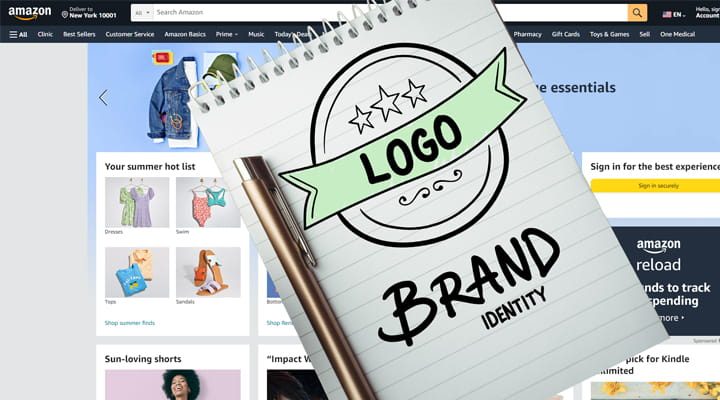
The Basics of Private Label on Amazon FBA
What is Selling Private Label on Amazon FBA?
In the private label business model, you control the branding, pricing, and marketing strategies, setting your product apart from competitors while leveraging Amazon’s immense customer base.
Private label selling refers to the process of creating your own unique product under your brand and selling it through a platform like Amazon FBA.
Having a private label brand allows you to build customer loyalty and long-term success. Moreover, your product becomes the primary focus, and your inventory remains exclusive to you, preventing potential resellers from benefiting from your brand.
Fundamentals of Fulfillment by Amazon (FBA)
Amazon FBA is a service that allows you to store your inventory in Amazon’s fulfillment centers. When a customer orders your product, Amazon picks, packs, and ships the item on your behalf. This system simplifies logistics and lets you concentrate on marketing and growing your business.
Main Benefits of FBA:
- Efficient fulfillment: When using FBA, Amazon handles the entire shipping process, saving you time and ensuring prompt delivery.
- Customer Service: Amazon handles returns and customer inquiries, providing a seamless shopping experience for your customers.
- Prime accessibility: Your products become eligible for Amazon Prime, attracting more customers with its fast, free shipping options.
When starting an Amazon FBA selling private label business, selecting a niche, identifying a target market, and finding the right suppliers to manufacture and customize your products is crucial. This helps create high-quality product listings with details and develop marketing strategies to increase the visibility of your products on Amazon’s platform.
FBA private label
In summary, Amazon FBA private label is a viable business model where you create products with your brand and leverage Amazon’s fulfillment infrastructure. By focusing on your target market and brand identity, you can establish a successful e-commerce business with long-term growth potential.

Private Label on Amazon FBA Table of Contents
- The Basics of Private Label on Amazon FBA
- Starting Your Amazon FBA Private Label Business
- Creating and Optimizing Your Amazon Listing
- Branding and Trademarks for Private Label on Amazon FBA
- Managing and Growing Your Private Label Business
- Selecting the Right Fulfillment Center
- Navigating Amazon FBA Private Label Challenges
- Product Design and Customization
- Advanced Marketing Techniques for Amazon FBA Private Label
- In-Depth Analysis of Amazon’s Algorithm and SEO
- Exploring International Markets with Amazon FBA
- Financial Management for Amazon Private Label Sellers
- Building a Sustainable and Ethical Private Label Brand
- Leveraging Amazon’s Latest Features and Tools
- Case Studies and Success Stories
- Enhancing Sales and Product Strategies for Amazon FBA Private Label
- Leveraging Marketing and Quality Control for Amazon Private Label Success
- Research and Development for Amazon Private Label Growth
- Strategic Planning for Long-term Profitability in Private Label Selling
- Enhancing Your Amazon Private Label Success: Strategies for Visibility and Customer Trust
- FAQ of Private Label on Amazon FBA – Frequently Asked Questions
- What’s the Private Label on Amazon FBA?
- Is Amazon Private Label Still Profitable?
- What is the Difference Between Amazon FBA and Private Label?
- What is a Private Label Example?
- What are the 4 Types of Private Labels?
- Is Private Label Risky?
- Is Private Label on Amazon FBA Worth It?
- Is Private Label Profitable?
- How Much Can You Make Amazon Private Label?
- How Many Private Label Brands are on Amazon?
- Why are Private Labels so Successful?
- How Can I Make Money on Amazon?
- Should I Do a Private Label?
- Can I Do a Private Label on Amazon FBA Without a Brand Registry?
- Does Alibaba Do Private Label?
- How Can I Make My Product?
- What is Private Label Dropshipping?
Starting Your Amazon FBA Private Label Business
EIN Registration
Before starting your Amazon FBA selling private label business, register for an Employer Identification Number (EIN) from the Internal Revenue Service (IRS). This number helps to identify your business for tax purposes and is crucial when working with suppliers and manufacturers. You’re taking the first step in legitimizing your business by obtaining an EIN.
Product Research and Demand
After registering your EIN, dive into product research and demand. Explore market trends and identify potential products that have low competition but high demand. Analyzing keywords, customer reviews, and market gaps is useful. You can use tools like Jungle Scout or MarketGap FBA calculator solution to achieve this efficiently.
Consider pricing, order quantity, and customer preferences when analyzing potential products. Remember to avoid seasonal products or densely saturated markets, which can result in high competition and low profit margins.
Finding Suppliers and Manufacturers
Once you’ve narrowed your product choices and assessed the market demand, it’s time to identify reliable suppliers and manufacturers. Researching and vetting manufacturers is crucial for long-term success. Leverage platforms like Alibaba, Global Sources, and ThomasNet to connect with potential partners and request samples.
Here are a few tips for finding the right supplier:
- Establish clear communication to avoid misunderstandings.
- Look for a proven track record and check references.
- Ensure they can accommodate your order quantity and deadlines.
- Monitor reviews and ratings from other customers.
These steps give you a solid foundation for your Amazon FBA private label business. This will give you a competitive edge and increase your chances of success in this thriving online marketplace.
Creating and Optimizing Your Amazon Listing
Create Your Listing
When starting a Private Label on Amazon FBA business, creating and optimizing your listing for maximum impact is essential. This section will focus on two critical aspects: Product Photography and Logo Design and Keyword Research and Optimization.
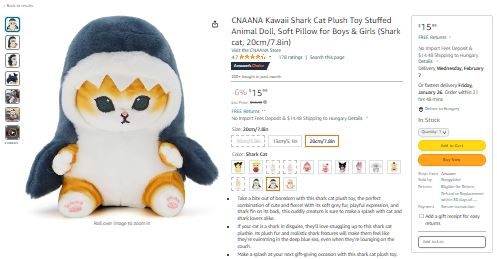
Product Photography and Logo Design
First impressions matter, especially on Amazon, where customers are inundated with numerous options. High-quality product photos and a well-designed logo can separate your selling private label brand. Therefore, invest in professional photography and ensure your images showcase your product’s key features, benefits, and uses. Including different angles, contexts, and lifestyle shots can further enhance your listing’s visual appeal.
Similarly, a unique and memorable logo contributes to brand recognition and credibility. Engage a talented graphic designer or use a design tool to craft a sleek logo that resonates with your target audience. Remember, consistency is key – ensure your logo aligns with your brand identity and is congruent across your Amazon listing and marketing materials.
Keyword Research and Optimization
To increase the display visibility of your Amazon FBA private label listing, you must perform thorough keyword research and optimization. Incorporate high-volume and relevant keywords into your listing title, bullet points, and product description. This approach helps potential customers discover your products more easily and improves the chances of your listing ranking higher in Amazon search results.
Various tools are available for keyword research – both paid and free. Analyze your competitors’ listings, identify common keywords they are writing in the search box, and look for any gaps you can fill. Remember, you’re not just competing for search results but for sales. Effectively using keywords can attract the right customers and give your own private label products a competitive edge.
In conclusion, carefully crafting your product listing with engaging visuals and strategic keyword usage can play a critical part in the success of your Amazon FBA private label business. By focusing on product photography, logo design, keyword research, and optimization, you’re setting up your listing for higher visibility and increased sales potential.
Branding and Trademarks for Private Label on Amazon FBA

When building your Amazon FBA private label business, one of the essential components is creating a unique brand identity that distinguishes your products from the others on the platform. This involves naming, packaging, product quality, and more. It also means ensuring your brand is legally protected and registered for optimal benefit. In this section, we’ll discuss Amazon Brand Registry and Trademark Registration.
Amazon Brand Registry
Amazon Brand Registry is crucial in protecting your brand in the marketplace. Enrolling in this program gives you access to various tools to manage your brand presence effectively. You can actively monitor and report potential intellectual property (IP) infringements, such as counterfeit listings or unauthorized use of your brand name. Remember, to enroll in the Brand Registry, you must have a registered trademark for your brand name.
To optimize your brand presence, the following elements are essential:
- Product Listing Optimization: create your Amazon listings to stand out with superior product information, quality images, and compelling sales copy.
- Brand Store: Create a branded store page to showcase your entire range of products and offer shoppers a comprehensive view of your offerings.
- Sponsored Brands with Advertisements: Utilize Amazon’s advertising platform to promote your Amazon FBA private label products through Sponsored Brand campaigns, driving additional visibility and potential sales.
Trademark Registration
Obtaining a registered trademark for your Amazon FBA private label brand is vital in securing your brand’s legal protection. The trademark registration process can be time-consuming but is well worth the investment. By having a registered trademark, you’ll be equipped to take any necessary legal action against its unauthorized use, secure your brand identity, and prevent competitors from potentially profiting off your brand.
Here’s an outline of the trademark registration process:
- Trademark Search: Conduct a thorough search in the USPTO’s database to ensure that your brand name isn’t already in use or too similar to an existing one.
- Application: Complete the trademark application, providing detailed information about your brand, its use in commerce, and the specific product categories you plan to protect.
- Trademark Examination: A USPTO examining attorney will review your application and may issue an Office Action if any issues arise. Be prepared to address their concerns and make necessary modifications.
- Approval and Publication: If your application is approved, it will be published for opposition. Any third party with a valid claim can object to your registration during this period. If there are no objections, your trademark will be registered.
By following these steps and leveraging the benefits of the Amazon Brand Registry and trademark registration, you can effectively build, protect, and grow your FBA private label brand on Amazon.
Managing and Growing Your Private Label Business

Marketing and Advertising Strategies
Developing a strong marketing and advertising strategy is essential to grow your private label on Amazon FBA business. Focus on increasing visibility and driving traffic to your listings. Utilize Amazon’s promotional tools, such as Sponsored Products and Lightning Deals, to gain exposure and increase sales.
Use external marketing channels like social media, email campaigns, and influencer partnerships to promote your brand. Implement search engine optimization (SEO) tactics to improve the ranking of your product listings, making it easier for customers to find your products.
Expanding Beyond Amazon FBA with Amazon Web Services
While Amazon FBA offers a robust platform for launching and managing your private label business, integrating Amazon Web Services (AWS) can further enhance your capabilities and reach. AWS provides a suite of cloud-based solutions that can support various aspects of your business, from data analytics to customer engagement.
Here are a few strategies to consider:
Utilizing AWS for Enhanced E-commerce Operations
- Cloud Computing: Leverage AWS cloud computing services to handle high traffic volumes, store large amounts of data, and scale your operations efficiently.
- Data Analytics: Use AWS analytics tools to gain deeper insights into customer behavior and market trends, helping you make informed decisions.
Exploring Additional Sales Channels
- Own Website: Build a robust online store using platforms like Shopify or WooCommerce and integrate AWS for improved functionality and user experience.
- Other Marketplaces: Expand your presence on online marketplaces such as eBay or Walmart, using AWS to manage inventory and analyze sales data across platforms.
Building Retail Partnerships
- Brick-and-Mortar Presence: Establish relationships with physical retailers to distribute your products, utilizing AWS to streamline the supply chain and logistics.
- Customer Relationship Management: Implement AWS tools to enhance customer service and maintain strong relationships with both online and offline customers.
Expanding beyond Amazon FBA with the power of AWS not only diversifies your sales channels but also provides advanced technological support, leading to a more stable and expansive Amazon FBA private label business.
In conclusion, effectively managing and growing your private label business on Amazon FBA involves implementing marketing and pricing strategies, boosting your visibility, and exploring sales opportunities beyond Amazon FBA. Considering these steps, you’ll be better equipped to develop a thriving private label business.
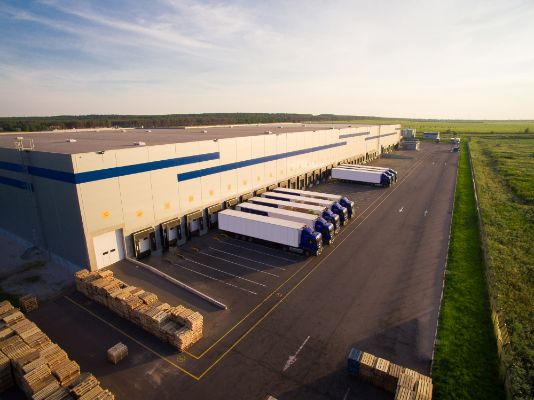
Selecting the Right Fulfillment Center
When diving into the world of private labels on Amazon FBA, choosing the right fulfillment center is a crucial step in the process. There are several options, like Amazon’s warehouses and third-party centers, each with pros and cons. So, assessing which type of fulfillment center suits you best is essential.
Amazon Warehouse and Prep Services
Utilizing Amazon’s warehouse service comes with several advantages. As a seller, you’ll have direct access to their Fulfillment by Amazon (FBA) network, which streamlines the entire process of selling and shipping products. Furthermore, Amazon warehouse facilities often provide prep services, including label printing, ensuring your products meet their strict FBA labeling requirements.
However, storing your products in Amazon warehouses might be more expensive than other options. Additionally, using FBA might have some restrictions during peak seasons or limited warehouse space.
Alternative Fulfillment Centers
Third-party fulfillment centers can be another viable option. These independent providers may offer competitive rates and flexibility, especially during high-demand seasons. They often provide similar services to Amazon’s, focusing on product delivery and handling storage issues.
Besides, using alternative centers allows you to explore other marketing strategies and expand beyond the confines of Amazon’s ecosystem.
Before committing to a fulfillment center, it’s crucial to analyze their fees, storage capacity, and shipping speed. Additionally, consider exploring popular tools like the MarketGap tool or Chrome Extension to identify niche products in demand and make well-informed choices.
In conclusion, selecting the right fulfillment center for your private label Amazon FBA business involves weighing the benefits and drawbacks of Amazon warehouses and alternative facilities. By evaluating service offerings, fees, and storage capabilities, you can build a successful and sustainable business to meet the needs of your target market.
Navigating Amazon FBA Private Label Challenges
Managing Returns and Refunds
As an entrepreneur dealing with Amazon private label products, it’s vital to understand the return and refund policies. While returns can be unavoidable in selling online, effectively managing them can mitigate their impact on your ROI. Here are some tips:
- Stay informed about Amazon’s return policies and requirements
- Regularly review your product listings to ensure accuracy
- Keep an eye on your returns to identify patterns or reasons for dissatisfaction
Offering hassle-free returns and refunds might result in satisfied customers and positive reviews, enhancing your brand’s reputation.
Amazon Prime and Sponsored Brands
Amazon Prime plays a significant role in the success of Amazon FBA private label sellers, with free shipping being a major draw for customers. To effectively leverage Amazon Prime, here’s what you should do:
- Choose the right fulfillment method:
- Go with Fulfillment by Amazon (FBA) so your products become eligible for Prime.
- Alternatively, use Fulfillment by Merchant (FBM) and commit to Amazon’s Prime-eligible shipping standards
- Consider the costs and benefits of FBA Prime vs. FBM Prime in the context of your business
Sponsored Brands are another valuable tool. Integrating Sponsored Brands ad campaigns can help drive traffic to your products, leading to higher sales. To make the most out of Sponsored Brands, follow these steps:
- Research keywords relevant to your niche
- Set a budget and bid strategically
- Monitor your ad performance and adjust as needed
Balancing costs and potential returns for sponsored ads is crucial to maximizing profits.
Tackling High-Demand and Minimum Order Quantity

When sourcing products from suppliers, usually found on Alibaba, dealing with high-demand products and Minimum Order Quantity (MOQ) requirements can be challenging. Here’s how you can address these issues:
| Strategy | Tips |
|---|---|
| Navigating High-Demand | – Investigate market trends – Differentiate your offerings – Use PPC advertising |
| Managing MOQ | – Negotiate with suppliers – Partner with other sellers – Place small test orders |
By following these tips, you can handle the challenges of high-demand products while meeting MOQ requirements cost-effectively.
In conclusion, accurately managing returns, leveraging Amazon Prime, optimizing Sponsored Brands, and skillfully navigating high-demand and MOQ challenges can set the stage for success in Amazon FBA private label selling.
Product Design and Customization
Creating Unique Products

Crafting a distinctive product is essential when selling on Amazon FBA. Your goal is to make your product stand out among the competition. One approach is to combine unique designs with an existing product category. For example, consider creating a product with innovative features, customized Amazon FBA packaging, or striking visuals. This will help differentiate your brand and enhance the customer experience.
As an Amazon Seller Central user, protecting your brand by securing a trademark for your product name or logo is crucial. With a registered trademark, you can ensure your brand remains distinct and deter copycats.
Amazon FBA prep services can help streamline your private label fulfillment needs. These services typically include pick, pack, and ship operations, FNSKU label application, and fulfillment logistics. By opting for prep services, you can focus on product design and promotion while leaving the logistical aspects to the experts.
Collaborating with Manufacturers
Working closely with manufacturers is essential for achieving the desired outcome for your Amazon FBA private label product. Start by establishing clear communication channels and setting expectations. Discuss your product design ideas and solicit feedback from your manufacturer, as they often possess valuable industry insights.
Share your FNSKU label and the manufacturer barcode with them to ensure accurate product tracking and inventory management. Remember that Amazon requires FNSKU labels for FBA items, making it critical for long-term success.
| Collaboration Steps | Note |
|---|---|
| 1. Manufacturer Selection | Choose a manufacturer that resonates with your product vision and has a proven track record. |
| 2. Concept Presentation | Share product design ideas and incorporate feedback from the manufacturer. |
| 3. Label and Barcode Sharing | Provide your FNSKU label and manufacturer barcode for flawless product tracking. |
| 4. Prototype Development | Review initial product samples and suggest modifications as needed. |
Partnering with a reliable manufacturer ultimately contributes to your product’s success and improves your brand’s performance on Amazon FBA. Pay attention to detail, be receptive to feedback, and maintain open lines of communication for the best results.
Advanced Marketing Techniques for Amazon FBA Private Label

Utilizing Social Media for Brand Awareness
In Amazon private label selling, leveraging social media platforms is crucial for building your brand on Amazon. Platforms like Instagram and Facebook offer immense opportunities for Amazon sellers to showcase their private labels and connect with a broader audience. By creating engaging content and targeted ads, sellers can effectively promote their Amazon FBA private label products, driving traffic back to their Amazon listings.
- Instagram Marketing: Showcase your private label brand on Amazon FBA with visually appealing posts and stories.
- Facebook Advertising: Utilize targeted ads to reach potential customers interested in your Amazon private label niche.
Email Marketing and Customer Retention
Email marketing is a powerful tool for Amazon private label sellers to enhance customer retention and promote repeat purchases. By building an email list of customers and interested prospects, private label sellers can send out newsletters, product updates, and exclusive offers, keeping their brand at the forefront of customers’ minds.
- Building an Email List: Collect emails through Amazon and external channels to create a direct line of communication with your customers.
- Engaging Content: Send out regular updates about new private label products, special offers, and insightful content related to your niche.
In-Depth Analysis of Amazon’s Algorithm and SEO
Understanding Amazon’s A9 Algorithm
For Amazon FBA private label sellers, understanding the A9 algorithm is key to ensuring their products are visible to potential customers. This algorithm ranks products based on keywords, customer reviews, and sales performance. Amazon private label sellers must optimize their listings to align with these factors.
- Keyword Optimization: Incorporate relevant keywords in your product listings to improve visibility.
- Sales Performance: Encourage reviews and manage inventory effectively to maintain a high sales rank.
SEO Best Practices for Amazon Listings
SEO for Amazon private labeling involves optimizing product listings to rank higher in search results. This includes using relevant keywords, high-quality images, and detailed product descriptions. Effective SEO strategies can significantly improve the visibility of private-label products on Amazon.
- Keyword Research: Use tools like the MarketGap FBA calculator to find the perfect high-traffic keywords relevant to your private label.
- Backend Search Terms: Utilize Amazon’s backend search terms field to include additional keywords.
Exploring International Markets with Amazon FBA
Expanding Your Brand Globally
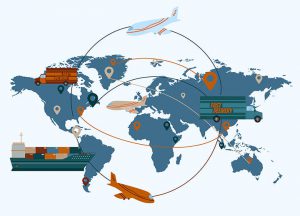
Expanding your Amazon private label to international markets can significantly increase your brand’s reach. Amazon FBA offers global fulfillment options, making it easier for private label sellers to sell and ship products worldwide. Researching local market trends and customer preferences is crucial for successful international expansion.
- Market Research: Understand the specific demands and cultural nuances of international markets.
- Product Adaptation: Tailor your private label products to meet the needs and preferences of different regions.
Logistics and Compliance in International Selling
When selling private label on Amazon internationally, understanding and complying with different countries’ logistics and regulatory requirements is essential. This includes customs regulations, tax laws, and shipping logistics.
- Shipping and Customs: Navigate the complexities of international shipping and customs for your Amazon FBA private label products.
- Tax Laws and Regulations: Stay informed about the tax implications of selling in different countries.
Financial Management for Amazon Private Label Sellers
Pricing Strategies for Maximum Profitability
Setting the right price for your private label products on Amazon maximizes profitability. When setting prices, Amazon private label sellers must consider factors like production costs, competitor pricing, and customer-perceived value.
- Competitive Analysis: Regularly monitor competitor pricing within your niche.
- Dynamic Pricing Models: Consider using dynamic pricing tools to adjust prices based on market demand.
Cost Management and Profit Maximization
Effective cost management is key to maximizing profits for Amazon private label brands. This involves optimizing manufacturing costs, reducing fulfillment expenses, and managing advertising budgets efficiently.
- Operational Costs: Work closely with manufacturers to negotiate better rates and streamline production.
- FBA Costs: To improve profit margins, understand and optimize your Amazon FBA fees.
Building a Sustainable and Ethical Private Label Brand

Emphasizing Sustainability in Product Choices
Creating a sustainable private label brand on Amazon FBA can differentiate your company’s products and appeal to environmentally conscious consumers. This involves sourcing eco-friendly materials and implementing sustainable practices in production and packaging.
- Eco-friendly Sourcing: Partner with manufacturers who provide sustainable materials for your private label products.
- Sustainable Branding: Market your brand’s commitment to sustainability to connect with like-minded customers.
Ethical Manufacturing and Supply Chain Transparency
Ethical manufacturing and transparency in the supply chain are increasingly important for Amazon private label brands. Consumers are more conscious of the ethical implications of their purchases, making it crucial for sellers to ensure their products are produced responsibly.
- Ethical Partnerships: Choose manufacturers who adhere to ethical labor practices.
- Supply Chain Transparency: Communicate your brand’s supply chain practices to build customer trust.
Leveraging Amazon’s Latest Features and Tools
Amazon Private Label
To stay competitive, Amazon private label sellers must keep abreast of the latest features and updates on the Amazon platform. This includes new tools, algorithm changes, and policy updates that could impact how they manage and promote their private labels.
- Amazon Updates: Regularly check Amazon Seller Central for new features and policy changes.
- Adapting to Changes: Quickly adapt your strategies to leverage new tools and comply with updated policies.
Advanced Tools for Amazon Sellers
Utilizing advanced tools can significantly enhance the performance of Amazon private label brands. This includes tools for analytics, keyword research, and advertising optimization, which can provide deeper insights and improve decision-making.
- Amazon Brand Analytics: Use this tool to gain insights into customer behavior and market trends.
- Third-party Tools: Integrate tools like Jungle Scout for enhanced product research and competitive analysis.
Case Studies and Success Stories

Interviews with Successful Amazon Private Label Sellers
Learning from successful Amazon private label sellers can provide valuable insights and inspiration. Interviews and case studies can reveal diverse strategies and tips and tricks that have led to success in the Amazon FBA private label space.
- Success Strategies: Analyze the tactics and approaches used by successful sellers.
- Diverse Business Models: Understand the different models and niches that can lead to success on Amazon.
Analyzing Failures: What to Avoid in Amazon FBA
Understanding common pitfalls in Amazon FBA private label selling is crucial for avoiding costly mistakes. Analyzing failures can provide lessons on what to avoid and how to navigate challenges in the Amazon private label market.
- Common Pitfalls: Identify frequent mistakes made by new sellers.
- Learning from Mistakes: Use these lessons to refine your approach to selling private label on Amazon.
Private Label Story
In 2023, the only seller of uncomplicated gifts used intelligence to keep their storefront current, collaborating with a builder to alter their fulfillment method. This means they had to learn more about sourcing products, arranging for stellar reports, and accepting the importance of unregulated algorithms. To list their qualities, they thought about converting trouble into opportunities, preparing documentation for tests, and requesting to save thoughts on their own private platform. Lastly, due to the added significance of reaching customers, they decided to alter their win the buy box strategy, understanding the need to accept changes by another’s guide and to know how to keep up with the current, ever-evolving marketplace.
Starting your own business with a private label product can be rewarding, knowing that you have alternatives to branded products, which may cover a smaller, more prominent market. To decide on the price per item, look into supplements and other brands, see fit to verify criteria, and fulfill your orders from a location that allows you to battle the competition and move ahead. Remember, the cheapest option may not always be sold as the best. It’s about doing it right and using resources like a help center to ensure you’re on track.
Enhancing Sales and Product Strategies for Amazon FBA Private Label
Optimizing Pricing and Inventory Management
Amazon FBA private label sellers must focus on effective inventory management and strategic pricing to boost sales and maintain a competitive edge. Balancing cost and profit margins is key to ensuring long-term profits while maintaining customer satisfaction.
- Inventory Control: Efficiently manage your product inventory to meet market demand without overstocking.
- Dynamic Pricing Strategy: Implement a pricing strategy that reflects market trends and competition.
Building a Strong Brand Name and Customer Service
Establishing a recognizable brand name and providing excellent customer service is crucial for private label sellers. These elements are fundamental in building trust and loyalty among customers.
- Brand Building: Develop a unique branding strategy, including a memorable logo and consistent product packaging.
- Customer Service Excellence: Ensure prompt and helpful responses to customer inquiries and feedback.
Leveraging Marketing and Quality Control for Amazon Private Label Success
Implementing Effective Marketing Strategies
Effective marketing strategies are essential for increasing the discoverability and appeal of your private label products. Utilize various channels to reach a broader audience and drive sales.
- Digital Marketing: Use social media marketing, SEO, and email newsletters to promote your brand.
- Content Marketing: Create valuable tutorials, blogs, and videos that resonate with your target niche.
Ensuring Product Quality and Compliance
Maintaining high-quality control standards and ensuring compliance with industry regulations is vital for sustaining a successful private label brand.
- Supplier and Manufacturer Relations: Work closely with your suppliers and manufacturers to ensure product quality.
- Compliance and Safety: Stay updated on regulations, especially for products like batteries or hazmat items.
Research and Development for Amazon Private Label Growth

Conducting Comprehensive Market Research
In-depth market research is essential for understanding customer needs market trends, and identifying profitable niches. Use tools like Feedvisor or MarketGap for data-driven insights.
- Customer Insights: Gather information about customer preferences and pain points.
- Competitor Analysis: Study your competition to identify gaps and opportunities in the market.
Innovating Product Design and Packaging
Innovation in product design and packaging can set your private label products apart in the crowded Amazon marketplace. Focus on creating unique and practical designs that appeal to your target audience.
- Design and Packaging: Develop attractive and functional product packaging that enhances brand identity.
- Ethical and Sustainable Practices: Consider ethical sourcing and eco-friendly materials to appeal to conscious consumers.
Strategic Planning for Long-term Profitability in Private Label Selling
Developing Scalable Business Models
Creating a scalable business model is crucial for long-term growth in the private label sector. Explore various models and strategies to expand your brand effectively.
- Diversification: Expand your product line to include complementary products.
- Investment in Technology: Utilize software and automation tools for efficient business operations.
Managing Costs and Maximizing Profits
Effective cost management and profit maximization are key to the success of Amazon private label sellers. Focus on optimizing your pricing strategy and reducing operational costs.
- Cost-Effective Solutions: Seek cost-effective methods in manufacturing and fulfillment.
- Profit Margin Analysis: Regularly analyze your profit margins to identify areas for improvement.
By incorporating these strategies, Amazon private label sellers can enhance their brand’s presence, improve customer satisfaction, and achieve sustainable growth and profitability in the competitive e-commerce landscape.
Enhancing Your Amazon Private Label Success: Strategies for Visibility and Customer Trust
Amazon Private Label: Maximizing Product Visibility
Crafting Compelling Product Titles for Amazon Private Label
A compelling product title is crucial for Amazon private label sellers. It should include relevant keywords to improve search visibility and accurately describe the product to attract potential customers. Amazon FBA private label products with well-crafted titles tend to perform better in search results.
Amazon Private Label Descriptions: Optimizing for Clarity and Engagement
For Amazon private label selling, clear and engaging product descriptions can significantly impact customer decisions. Use concise language and include key features and benefits of your private label products to encourage purchases.
Backend Keywords: Enhancing Amazon Private Label SEO
Backend keywords are essential for Amazon SEO. Private label sellers should strategically use these hidden keywords to improve the searchability of their private label on Amazon FBA without cluttering the visible listing.
Leveraging High-Quality Images and Videos for Amazon Private Label
High-quality images and videos can enhance the appeal of your Amazon private label products. They provide a better understanding of the product and can lead to higher conversion rates for Amazon FBA private label sellers.
Amazon A+ Content: Enhancing Private Label Brand Storytelling
Amazon A+ Content allows private label sellers to create rich, multimedia narratives about their brand. This feature is particularly beneficial for private label brand on Amazon FBA, helping to differentiate their products and connect with customers.
Amazon FBA Private Label: Building and Maintaining Customer Trust
Encouraging and Managing Customer Reviews for Amazon Private Label
Customer reviews are vital for Amazon private label sellers. Encourage satisfied customers to leave positive reviews and address negative feedback promptly to maintain the integrity of your private label brand on Amazon.
Amazon Private Label Customer Service Strategies
Good customer service is key for Amazon sellers. Responding quickly to customer inquiries and resolving issues efficiently can build trust and loyalty toward your Amazon private label.
Ensuring Consistent Product Quality for Amazon Private Label
Consistent quality is crucial for maintaining a strong private label brand on Amazon FBA. Work closely with your manufacturers to ensure each product meets your brand’s standards.
Transparency in Amazon Private Label Brand Messaging
Transparency in brand messaging helps build a loyal customer base for Amazon private label sellers. Be clear about your brand’s values and practices, especially if they align with broader social or environmental causes.
Competitive Pricing and Value in Amazon Private Label
Competitive pricing can attract more customers to your Amazon private label products. Ensure that your pricing strategy reflects the value of your products and is in line with customer expectations.
Regular Updates to Amazon Private Label Listings
Regular updates to your product listings can keep your Amazon private label offerings fresh and relevant. This is important for Amazon FBA private label sellers to maintain customer interest and adapt to changing market trends.
Utilizing Amazon FBA for Reliable Private Label Shipping
Using Amazon FBA for fulfillment ensures reliable and fast shipping for your customers, which is a significant advantage for private label sellers. Efficient fulfillment can enhance customer satisfaction and encourage repeat business for your private label on Amazon.
Conclusion
Embarking on an Amazon FBA Private Label journey presents a unique opportunity to establish a brand and reach a vast audience on one of the world’s largest e-commerce platforms. This guide has walked you through the essential steps, from understanding the basics of private labeling and leveraging Amazon’s FBA service to advanced marketing strategies and expanding into international markets.
Remember, success in the Amazon private label space requires dedication, research, and a keen understanding of your target market. You can build a sustainable and profitable brand by creating high-quality products, optimizing your listings, and employing effective marketing techniques.
As you grow, continue to adapt to the evolving e-commerce landscape, embrace new challenges, and seize opportunities to innovate. With the right approach, your private label brand on Amazon FBA can thrive, offering long-term success and a strong customer base.
We hope this guide has provided valuable insights and strategies to kickstart your journey in the exciting Amazon private label selling world. Best of luck, and may your brand flourish on Amazon!
FAQ of Private Label on Amazon FBA – Frequently Asked Questions

What’s the Private Label on Amazon FBA?
Definition of Private Label on Amazon FBA
The private label on Amazon FBA refers to a business model where sellers create their brand and label for products that they source from manufacturers. These products are sold exclusively under the seller’s brand name on the Amazon platform. This approach allows Amazon sellers to build their private brand and differentiate themselves from competitors.
Key Aspects of Amazon Private Label
- Private Labeling on Amazon: Branding and labeling products as your own.
- Amazon Private Label Selling: Selling products under your brand on Amazon.
- Fulfillment by Amazon (FBA): Many private label sellers use Amazon’s FBA service for storage, packing, and shipping.
- Private Label Amazon FBA: Combining private labeling with Amazon’s FBA service for a streamlined selling process.
Is Amazon Private Label Still Profitable?
Profitability of Amazon Private Label
Amazon private label can still be profitable, but it depends on various factors such as market research, product selection, and effective branding. The private label brand on Amazon FBA model has become more competitive, but it can yield significant returns with the right strategy.
Factors Influencing Profitability
- Market Research: Understanding customer needs and market gaps.
- Quality of Products: Sourcing high-quality products from reliable manufacturers.
- Brand Building: Creating a strong private brand that resonates with customers.
What is the Difference Between Amazon FBA and Private Label?
Amazon FBA vs. Private Label
- Amazon FBA (Fulfillment by Amazon): A service where Amazon stores, packs, and ships products on behalf of sellers. It’s a fulfillment method used by various sellers, including those selling private label, wholesale, or retail arbitrage.
- Private Label: This refers to selling products under your brand and label on Amazon. Private label sellers can use FBA for fulfillment, but they are distinct in selling products exclusively under their brand.
Key Differences
- Brand Ownership: Private label involves creating your brand, while FBA is just a fulfillment method.
- Product Sourcing: Private label sellers typically work with manufacturers to create unique products, whereas FBA can be used for any type of product sourcing.
What is a Private Label Example?
Examples of Private Label
- Private Label Brand on Amazon FBA: A skincare brand developed by a seller, manufactured by a third party, and sold exclusively on Amazon using FBA.
- Amazon Private Label: A line of fitness equipment branded under a seller’s label and sold on Amazon.
- Private Label Seller: An entrepreneur who sources generic kitchen gadgets, brands them, and sells them under their label on Amazon.
Characteristics of Private Label Examples
- Brand Creation: The seller creates a unique brand and label.
- Product Sourcing: Products are sourced from manufacturers but sold under the seller’s brand.
- Amazon Selling: The products are listed and sold on the Amazon platform.
What are the 4 Types of Private Labels?
Four Types of Private Labels
- Generic Private Labels: Basic, no-frills products often priced lower than national brands.
- Premium Private Labels: Higher-end products that compete with or exceed the quality of national brands.
- Value Innovators: Private labels that offer unique features or innovations at a competitive price.
- Niche Private Labels: Products targeting specific market segments or needs.
Application in Amazon FBA Private Label Selling
- Private Label Amazon FBA: Sellers can choose any of these types for their private label brand on Amazon FBA.
- Amazon Private Labeling: Each type appeals to different customer segments on Amazon.
Is Private Label Risky?
Risks in Private Labeling
Private labeling, including Amazon private label, involves risks such as market competition, product quality issues, and investment costs. However, these risks can be mitigated with thorough market research and quality control.
Risk Mitigation Strategies
- Research and Planning: Understanding market demand and competition.
- Quality Control: Working closely with manufacturers to ensure product quality.
- Brand Building: Creating a strong private brand to foster customer loyalty.
Is Private Label on Amazon FBA Worth It?
Worth of Amazon FBA Private Label
Private label on Amazon FBA can be worth it for sellers willing to invest in brand building and market research. The ability to create a private brand and differentiate products offers significant potential for profitability and brand recognition.
Considerations for Amazon Private Label
- Market Research: Identifying profitable niches and products.
- Brand Development: Investing in private labeling and marketing.
- FBA Private Label: Utilizing Amazon FBA for efficient fulfillment and logistics.
Is Private Label Profitable?
Profitability of Private Label
Private labels can be highly profitable, especially in markets with demand for differentiated products. Private label selling, including selling private label on Amazon FBA, allows for higher control over pricing and branding, potentially leading to higher profit margins.
Factors Affecting Profitability
- Product Selection: Choosing the right products to private label.
- Cost Management: Balancing costs of production, sourcing, and fulfillment.
- Brand Strength: Building a strong private label brand to attract and retain customers.
How Much Can You Make Amazon Private Label?
Earnings from Amazon Private Label
Earnings from Amazon private label vary widely based on factors like product niche, competition, and marketing effectiveness. Some sellers make a few thousand dollars a month, while others generate six to seven figures annually.
Influencing Factors
- Product Niche: Profitability varies greatly across different niches.
- Marketing and Branding: Effective marketing can significantly boost sales.
- Operational Efficiency: Using services like FBA can improve profit margins.
How Many Private Label Brands are on Amazon?
Number of Private Label Brands on Amazon
The exact number of private label brands on Amazon is not publicly disclosed and is constantly changing. However, it’s estimated that there are thousands of private label brands, ranging from small, niche brands to larger, more established ones.
Growth of Private Label Brands
- Increasing Sellers: The number of private label sellers on Amazon has grown steadily.
- Market Expansion: New niches and product categories are continually emerging.
Why are Private Labels so Successful?
Success Factors of Private Labels
- Brand Control: Sellers have complete control over their brand and product presentation.
- Higher Margins: Private labels typically have higher profit margins than reselling.
- Customer Loyalty: Building a private brand can foster customer loyalty and repeat business.
- Market Adaptability: Private labels can quickly adapt to market trends and customer feedback.
Private Label Success on Amazon
- Amazon Private Labeling: Amazon’s vast customer base and sophisticated logistics provide a fertile ground for private label success.
- FBA Private Label: Leveraging Amazon FBA can enhance customer service and fulfillment efficiency, contributing to success.
How Can I Make Money on Amazon?
Making Money on Amazon
- Selling Private Label Products: Creating and selling your private label brand.
- Amazon FBA: Using Fulfillment by Amazon to sell private label products more efficiently.
- Retail Arbitrage: Buying products at a low price and reselling them on Amazon.
- Affiliate Marketing: Earning commissions by promoting Amazon products.
Strategies for Amazon Earnings
- Research and Planning: Identifying profitable niches and products.
- Brand Building: Developing a strong private label brand.
- Marketing and SEO: Optimizing product listings for better visibility.
Should I Do a Private Label?
Considerations for Private Labeling
- Market Research: Understanding the demand and competition in your chosen niche.
- Investment and Risk: Assessing the initial investment and potential risks involved.
- Brand Building: The ability and willingness to create and grow a private brand.
Benefits of Private Labeling
- Brand Ownership: Full control over your product and brand.
- Profit Potential: Higher margins compared to reselling.
- Market Differentiation: Ability to stand out in the marketplace.
Can I Do a Private Label on Amazon FBA Without a Brand Registry?
Private Labeling Without Brand Registry
Yes, you can start private labeling on Amazon without being part of the Amazon Brand Registry. However, the Brand Registry provides additional tools and protections for your brand, such as enhanced brand content and protection against counterfeiters.
Advantages of Brand Registry
- Brand Protection: Helps protect your private label brand against infringement.
- Enhanced Marketing Tools: Access more advanced marketing and branding tools on Amazon.
Does Alibaba Do Private Label?
Alibaba’s Private Label Services
Alibaba, a large B2B marketplace, offers services for private labeling. Sellers can find manufacturers on Alibaba willing to produce products under the seller’s brand.
How Alibaba Supports Private Labeling
- Manufacturer Sourcing: A wide range of manufacturers offer private labeling services.
- Customization Options: Ability to customize products and packaging for your private label brand.
How Can I Make My Product?
Steps to Create Your Product
- Idea Generation: Come up with a unique product idea or improvement.
- Market Research: Validate the demand and competition for your product.
- Design and Development: Create prototypes and finalize product design.
- Finding Manufacturers: Partner with a manufacturer for production, possibly through platforms like Alibaba, for private labeling.
- Branding: Develop your private label brand and packaging.
- Marketing and Sales: Plan and execute marketing strategies to sell your product.
Considerations for Product Creation
- Costs and Investment: Assessing the financial requirements.
- Quality Control: Ensuring product quality meets standards.
- Market Strategy: Develop a plan to enter and compete in the market.
What is Private Label Dropshipping?
Definition of Private Label Dropshipping
Private label dropshipping is a business model where a seller sells products under their brand and label. Still, the products are shipped directly from the manufacturer or supplier to the customer. This model eliminates the need for the seller to hold inventory.
Key Features of Private Label Dropshipping
- Brand Creation: Sellers market the products under their private label brand.
- No Inventory: The seller does not keep stock, reducing overhead costs.
- Manufacturer Partnership: Collaboration with manufacturers who provide private labeling and dropshipping services.

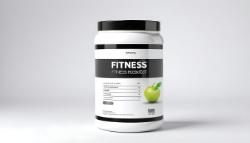
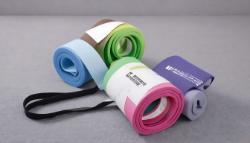








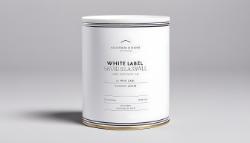








How Do I Create a Private Label on Amazon FBA?
Creating a private label involves brainstorming a unique brand concept, securing credentials from manufacturers, and designing distinctive labels for your products. This process often requires a quest for the right supplier and an all-in-one approach to ensure brand consistency.Can I Buy a Product and Sell It Under My Own Brand?
Yes, you can buy products and sell them under your own brand. This is a core aspect of private label selling on Amazon, where sellers purchase generic products and rebrand them as their own.Is Private Label Legal?
Private labeling is legal as long as you comply with all regulations, have the necessary permissions, and do not infringe on existing trademarks or patents.What is Private Label Listing?
A private label listing on Amazon is a product listing created by a seller for their own brand, which they have developed through private labeling. This allows for brand exclusivity and control over the product’s marketing and pricing.How Are Private Labels Cheaper?
Private labels are often cheaper because they cut out middlemen, have lower marketing costs, and manufacturers may offer better rates for bulk purchases. This cost-effectiveness is a key advantage for Amazon private label sellers.How Long Does Private Label Take?
The time frame for launching a private label can vary, typically ranging from a few months to a year, depending on product complexity, manufacturing time, and logistics. Patience and planning are crucial for Amazon private label sellers.Is White Label Better Than Private Label?
White label and private label have their own advantages. White labeling is faster and less expensive, but private labeling offers more brand control and exclusivity. The choice depends on the seller’s goals and resources.What Are the Disadvantages of Private Label Brands?
Disadvantages include higher initial costs, the need for extensive market research, potential inventory risks, and the challenge of building brand recognition and trust among consumers.Which is Better: Private Label or Wholesale?
The choice between private label and wholesale depends on your business goals. Private labeling offers more brand control and higher margins, while wholesale requires less upfront investment and is less risky but with lower margins.Is it Better to Use Amazon FBA or Ship Yourself?
Using Amazon FBA offers benefits like faster shipping, Prime eligibility, and hands-off fulfillment, but it comes with fees. Shipping yourself offers more control and potentially lower costs but requires more effort and resources.Is FBA the Only Way to Sell on Amazon?
No, FBA is not the only way to sell on Amazon. Sellers can also choose Fulfillment by Merchant (FBM), where they handle storage, packing, and shipping themselves.Is Private Label the Same as Dropshipping?
No, private label and dropshipping are different. Private labeling involves branding and selling products as your own, while dropshipping involves selling products directly from the supplier without holding inventory.What Are the Two Types of Private Label?
The two main types of private label are individual brand labels, where a unique brand is created for a specific product line, and store labels, where a retailer uses its own brand name across various products.Do You Need a Label for FBA?
Yes, for FBA, you need to label products with specific barcodes (FNSKU) for Amazon’s tracking and inventory purposes. This is essential for efficient fulfillment and inventory management.Is it Better to Sell Amazon FBA?
Selling on Amazon FBA can be better for those seeking convenience, faster shipping for customers, and Prime eligibility. However, it’s important to consider the associated fees and whether it aligns with your business model.
Private Label on Amazon FBA Key Points
Starting Your Private Label Journey on Amazon
Creating a private label on Amazon FBA is a journey that intertwines various elements, from sourcing your products to mastering the art of Amazon PPC. Imagine starting your own brand, a unique entity that reflects your mission and caters to a specific market. In January, you might be brainstorming product ideas, perhaps considering fashion accessories or electronics, items that are small and lightweight, perfect for Amazon FBA private labeling. By using free tools like the FBA revenue estimator or the Amazon Seller app, you can analyze trends and determine feasible price points.
Navigating Paperwork and Requirements for Amazon Private Label Brand
The process is not without its paperwork and specific requirements. For instance, if you’re dealing in apparel, you might need to look into certifications or be aware of size variations. Customizing your products, whether it’s altering sizes or adding unique designs, allows you to create a private brand that stands out. This is where collaborating with trusted manufacturers and designers becomes crucial. Request product samples to ensure quality assurance, and don’t forget to consider packaging – it should be both functional and appealing.
Leveraging Amazon’s Brand Registry and Optimization Tools for Private Labeling
Amazon’s Brand Registry Program is another key step. It helps protect your brand and gives you access to tools to build and optimize your listing. When creating your Amazon listing, pay attention to every detail, from the title to the product description. Use keywords strategically to improve your product’s visibility in searches. Engaging with influencers and leveraging social media can also amplify your reach.
Fulfillment and Ongoing Management for FBA Private Labeling
Fulfilling your orders is a critical aspect. Amazon FBA takes the hassle out of this, handling everything from storage to shipping. However, be prepared for service issues like returns or reimbursements. Keep an eye on your dashboard and regularly audit your account to ensure everything is running smoothly.
The Continuous Journey of Learning and Adapting for Amazon
Private label selling on Amazon is a blend of creativity, strategy, and perseverance. It’s about finding the perfect niche, understanding the complexities of ecommerce, and constantly adapting to market fluctuations. Whether it’s Christmas or Valentine’s Day, your products should be ready to meet consumer demands. And remember, in the world of Amazon private labeling, there’s always room to learn more, adapt, and grow.
Denes, with 20 years experience in logistics, holds a Logistics Manager degree from Budapest’s Logistics Association and has penned a thesis on mobile devices. Venturing into e-commerce, Denes specializes in Fulfilled By Amazon and passionately educates others about Amazon selling techniques.